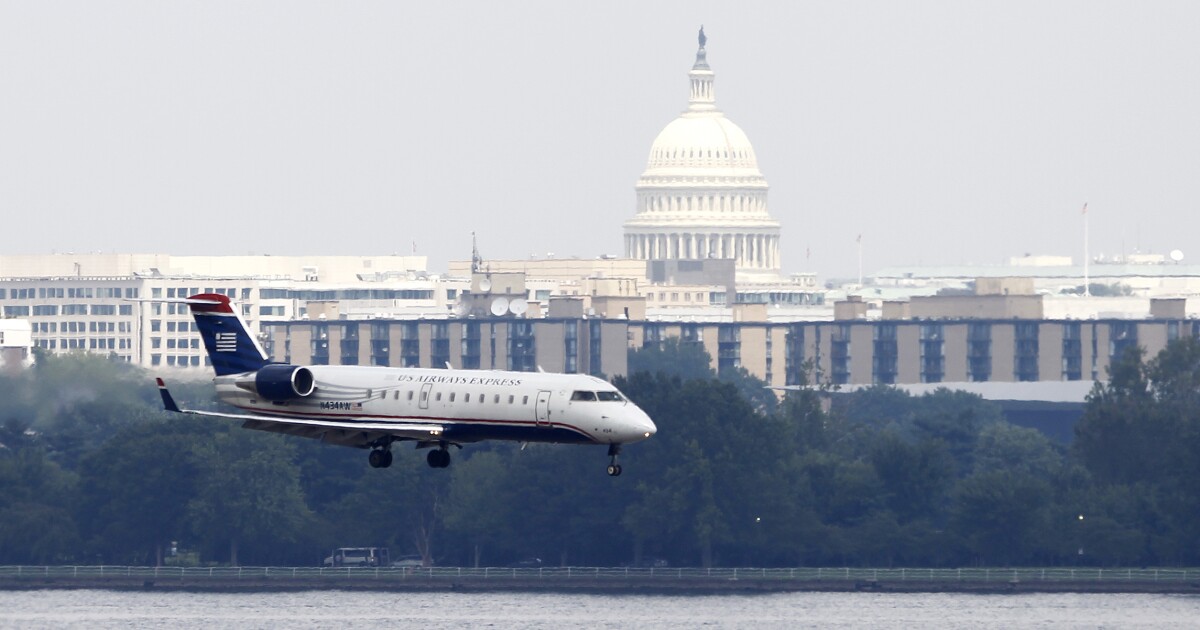

The House passed a major aviation policy bill, but it’s still a long way from becoming law, and the clock is ticking until the Sept. 30 deadline when the current Federal Aviation Administration authorization expires.
The Senate Commerce Committee plans to consider its version of the bill this month, and then the two sides must compromise on their proposals by the end of September.
TONY BENNETT DEAD: LEGENDARY SINGER DIES AT 96
While the drama in the House has been resolved, the Senate still must overcome several hurdles, and it’s looking unlikely the bill will be passed before the upper chamber’s August recess, which typically lasts five weeks. Even if the Senate Commerce Committee finalizes its version this month, it’s unlikely the bill will go to the Senate floor before the August work period.
DCA Flight Perimeter Rules
On Wednesday night, lawmakers in the House voted down an attempt to expand long-distance flights at Reagan National Airport, the airport closest to the nation’s capital, 229 to 205. The amendment would have added seven new round-trip flights to the airport. At issue was the perimeter rule, which limits the number of flights that travel more than 1,250 miles from DCA. Both Reagan and Dulles International Airport are owned by the federal government, which means Congress has the power to decide how they operate.
Delta Air Lines and Western lawmakers argue Reagan National Airport has been underutilized, and United Airlines and Washington, D.C.-area lawmakers claim the airport is already among one of the busiest in the country. An internal FAA memo found that 20 more daily round-trip operations would increase delays by 25.9%, and an increase of 25 daily round-trip operations would increase delays by 33.2% at DCA.
However, it’s clear the House’s bill will not be the final word. The Senate intends to consider a similar proposal in its version of the bill, and it could also come up during the conference negotiations. Senate Commerce Committee Chairwoman Maria Cantwell (D-WA) and ranking member Ted Cruz (R-TX) made a deal to introduce an amendment to the bill that would give the airport four more slots beyond the airport’s perimeter rule. The amendment still needs a vote in the Commerce Committee before it can be added to the legislation, but the panel delayed a recent markup amid an ongoing dispute on a different issue.
“My message to both Leader Schumer and Chairwoman Cantwell has been unequivocal. Don’t mess around with our airports. Don’t do it,” said Sen. Tim Kaine (D-VA) on Thursday, who has been fiercely advocating against the change. “If we add in extraneous issues, like flights into DCA, it delays by years given the FAA reauthorization.”
“So our answer, Sen. Warner and I are not putting in amendments to change flights in the mid-continental parts of the country like Kansas City, don’t mess around with our airports,” Kaine added.
Kaine, along with Sens. Mark Warner (D-VA), Ben Cardin (D-MD), and Chris Van Hollen (D-MD), emphasized last week they would not be able to support an FAA reauthorization bill that expands the perimeter, even if it would be a modest change.
Capital Access Alliance, a coalition of business groups including Delta Airlines, is also signaling the fight is far from over.
“Those lobbying against this are bent on protecting one big airline at the expense of air travelers, so we are encouraging the Senate Commerce Committee to stand on the side of consumers and support a modest reform that will give them more choices and lower ticket prices,” Brian Walsh, a spokesman for the coalition, said in a statement provided to the Washington Examiner on Friday.
CAA continues to argue the congestion issues addressed in the FAA memo are not a problem during certain parts of the day and can create an opening for new flights.
“The FAA’s own data shows that DCA is underutilized in at least three key time blocks each day and has the ability to handle a modest number of new flights which is why this has been endorsed by former FAA Administrator Michael Huerta and other aviation experts,” Walsh said.
“It would in no way impact current service or safety, but it would make our nation’s capital more accessible and affordable for many Americans.”
Pilot age changes
Rep. Troy Nehls (R-TX) was able to include an amendment in the House’s version of the bill that would raise the commercial pilot retirement age from 65 to 67. The change is intended to expand the pilot workforce. However, there are opponents to this in both parties. The Biden administration argues the change could affect safety and could cause logistical challenges because pilots older than 65 are unable to fly internationally. The largest pilots union, the Air Line Pilots Association, has been advocating against the change.
“The Europeans studied it and said you shouldn’t change the retirement age,” said Capt. Jason Ambrosi, president of the Air Line Pilots Association, on a recent podcast. “There has been no study here, no data to support raising the retirement age here. So, factually, those that would like to raise the age, there hasn’t been any homework done.”
It’s still unclear how the issue will be handled in the Democratically-controlled Senate. Currently, the Senate bill does not touch this issue.
Pilot training requirements
The House ultimately voted to retain current pilot training rules after an effort to allow additional flight simulator time to count toward the 1,500-hour training requirement was stripped out of the FAA reauthorization.
Some regional airlines have advocated to change the rules in an effort to boost the pilot workforce. However, many lawmakers on both sides of the aisle want to see it maintained after it was instituted following a plane crash near Buffalo, New York, in 2009, killing everyone on board.
A dispute over this same pilot training rule has taken center stage in the Senate Commerce Committee and is a huge reason why the committee’s markup stalled last month. Sens. John Thune (R-SD) and Kyrsten Sinema (I-AZ) offered an amendment that would allow pilots to train on simulators, and that would count toward the 1,500-hour requirement. Most Democrats, including Senate Majority Leader Chuck Schumer (D-NY), oppose changing the current pilot rules. If all Republicans join Sinema in supporting the amendment, it could have enough votes to pass, setting up a clash with the lower chamber’s version.
Sen. Tammy Duckworth (D-IL), the chairwoman of the aviation subcommittee, is advocating to maintain the current training standards. The former Army helicopter pilot preemptively introduced a bill this week in an effort to highlight the issue and protect the rule.
“This is my red line. We cannot decrease flying hours at the risk of public safety,” Duckworth told reporters on Tuesday. “I am not going to be complicit in efforts to lower the real-world flight hours requirements that protect the flying public in the middle of an aviation safety crisis. And I will not budge on that.”
Consumer protections
The Senate’s bill includes several consumer protections that airlines are lobbying against, claiming they will make air travel more expensive and are too difficult to enforce. Those provisions are likely to face opposition from Republicans in the House, who have advocated more deregulation of airlines.
Sens. Richard Blumenthal (D-CT) and Ed Markey (D-MA) introduced a “passengers’ bill of rights” bill this year. The legislation is intended to prevent airlines from charging unreasonable fees for seat selection, checked bags, refunds for lost luggage, and compensation for passengers booted off an oversold flight.
“To be very blunt, the major obstacle to improving service is the industry’s lobbying,” Blumenthal told the New York Times.
CLICK HERE TO READ MORE FROM THE WASHINGTON EXAMINER
The looming deadline
The FAA’s authorization to operate and to collect and spend tax dollars added to airline tickets will expire at the end of September. Once the Senate Commerce Committee marks up the bill, which is anticipated next week, it will go to the Senate floor for a full vote.
Following the vote, negotiators from both the House and Senate will meet and reconcile the two packages. That often can take weeks or even months with complex legislation. If lawmakers are unable to complete all these tasks before the Sept. 30 deadline, they will need an extension.





